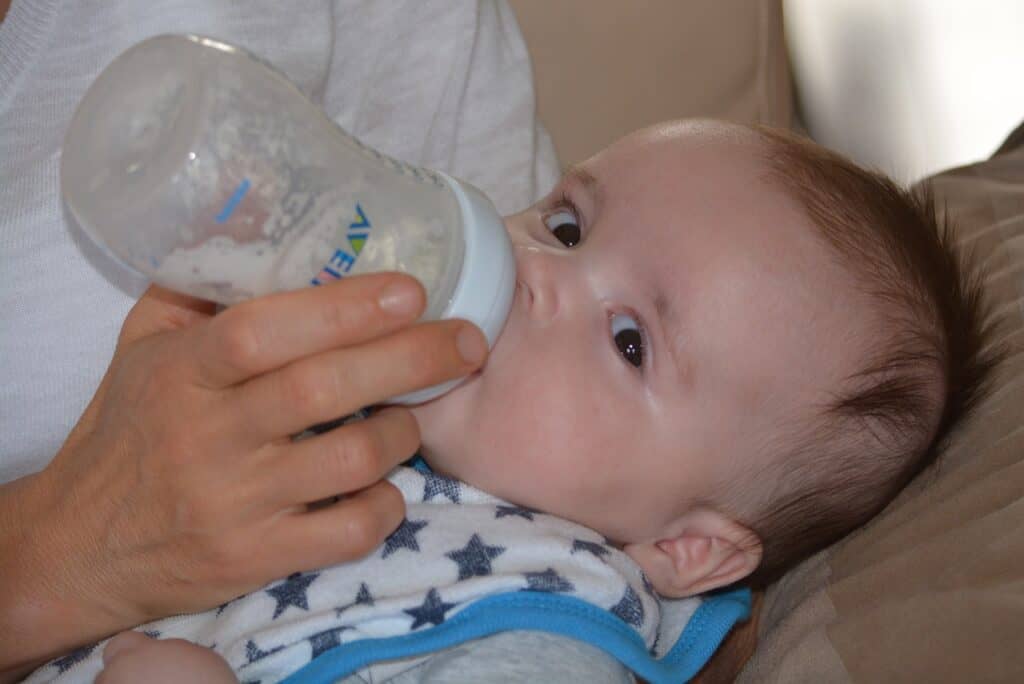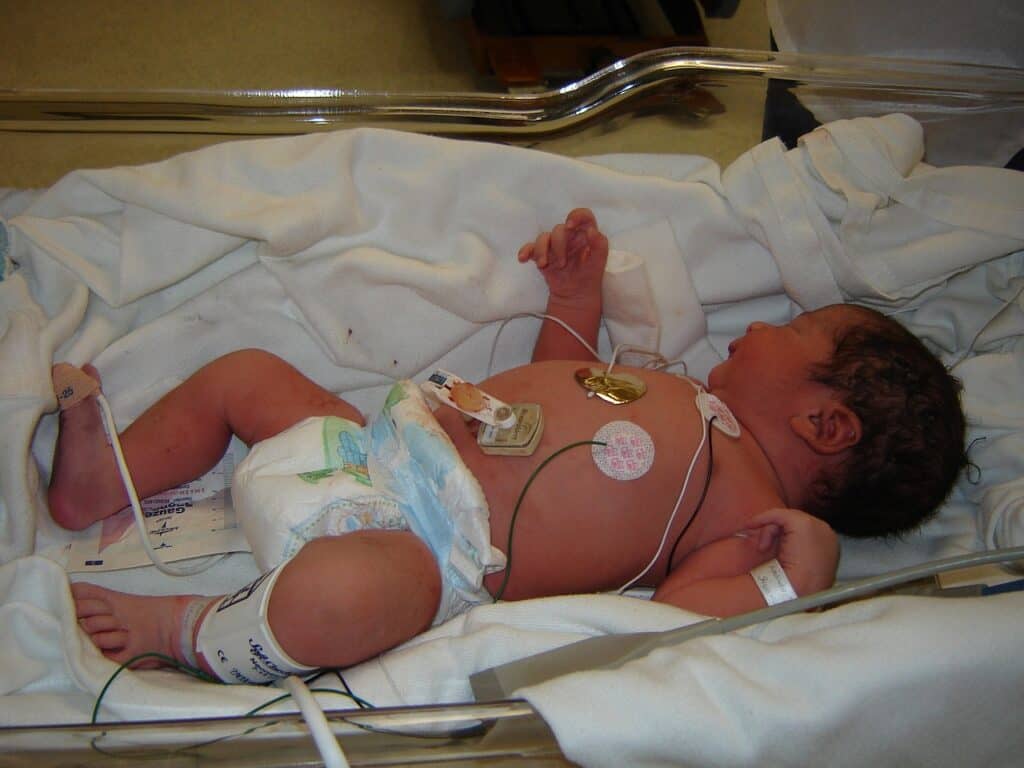Newborns are known for spitting up small amounts of milk after feedings, but what happens when they spit up clear liquid hours after eating? This can be a cause for concern for many parents, especially if it happens frequently. In this article, we will explore the possible causes of newborns spitting up clear liquid hours after eating, as well as ways to prevent and treat it.
Understanding Newborn Spitting Up:
Spitting up is a common occurrence in newborns and is usually nothing to worry about. It is the result of the immature digestive system of a newborn and is often caused by overfeeding, swallowing air during feedings, or a weak muscle at the top of the stomach. However, if a newborn is spitting up clear liquid hours after eating, it may be a sign of a more serious issue.
Key Takeaways
- Spitting up clear liquid hours after eating may be a cause for concern in newborns.
- Possible causes include gastroesophageal reflux disease (GERD) and pyloric stenosis.
- Treatment options include changes in feeding habits and medical intervention.
Understanding Newborn Spitting Up
Newborn spitting up is a common occurrence that many parents experience. Spit-up is when a small amount of milk or formula comes back up through the baby’s mouth after feeding. It can happen immediately after feeding or hours later. Spit-up is a normal part of a baby’s development, and it usually decreases as the baby gets older.
There are a few reasons why a baby may spit up. One reason is that their digestive system is still developing. The muscles in their digestive tract are not yet strong enough to keep the milk down, so it comes back up. Another reason is that the baby may have overeaten. If a baby eats too much, their stomach may not be able to hold all of the milk, and some of it may come back up.
It’s important to note that spitting up is not the same as vomiting. Vomiting is forceful and can be a sign of illness. Spit-up, on the other hand, is usually gentle and doesn’t cause the baby any discomfort.
If a baby is spitting up frequently or seems to be in pain when they spit up, it’s important to talk to a doctor. They may have a condition like gastroesophageal reflux disease (GERD) that requires medical attention.
In summary, newborn spitting up is a normal part of a baby’s development. It’s usually nothing to worry about, but if a baby is spitting up frequently or seems to be in pain, it’s important to talk to a doctor.
Possible Causes of Spitting Up Clear Liquid
Newborns spitting up clear liquid hours after eating can be a common occurrence. Here are some possible causes:
- Gastroesophageal reflux (GER): This is a condition where stomach contents flow back up into the esophagus. GER is common in infants and can cause spitting up of clear liquid.
- Overfeeding: Overfeeding can cause the stomach to become too full, leading to spitting up. It is important to follow feeding guidelines and not force a baby to finish a bottle.
- Lower esophageal sphincter (LES): The LES is a muscle that separates the esophagus from the stomach. If it is not fully developed, stomach contents can flow back up into the esophagus.
- Allergy: Some babies may have an allergy to certain foods, such as dairy products, which can cause spitting up.
- Teething: Teething can cause excess drool, which can lead to spitting up.
- Illness: Some illnesses, such as colds, can cause spitting up due to excess mucus production.
- Pyloric stenosis: This is a condition where the muscle between the stomach and small intestine becomes too thick, making it difficult for food to pass through. Symptoms include projectile vomiting and spitting up.
- Excess drool: Excess drool can be caused by teething or overstimulation and can lead to spitting up.
- Reflux: Reflux is similar to GER but is more severe and can cause discomfort and irritability in babies.
- Dehydration: If a baby is not getting enough fluids, they may spit up clear liquid.
- Pediatric gastroesophageal reflux (PGER): This is a more severe form of GER that can cause complications such as breathing problems and failure to thrive.
- Infant reflux/acid reflux: This is a condition where stomach contents flow back up into the esophagus, causing discomfort and irritability in babies.
- Curdled milk: Spitting up curdled milk can be a sign of acid reflux or an intolerance to certain foods.
- Green or yellow fluid: Spitting up green or yellow fluid can be a sign of an infection or blockage in the digestive system.
- Sudden Infant Death Syndrome (SIDS): While spitting up is not a direct cause of SIDS, it is important to always place a baby on their back to sleep to reduce the risk of SIDS.
- Heartburn: Heartburn can cause discomfort and irritability in babies and can lead to spitting up.
It is important to consult a healthcare provider if a baby is spitting up excessively or if there are any concerns about their feeding or digestive habits.
Symptoms and Indications
Physical Symptoms
Newborns are known to spit up small amounts of milk or formula after feeding, which is completely normal. However, if a newborn is spitting up clear liquid hours after eating, it could indicate some underlying issues. Some physical symptoms to look out for include:
- Frequent spitting up of clear liquid
- Projectile vomiting
- Coughing or choking during or after feeding
- Diarrhea
- Wheezing or coughing
- Sore gums or drooling
- Dehydration
If a newborn is experiencing any of these physical symptoms, it is important to seek medical attention immediately.
Behavioral Signs
In addition to physical symptoms, there are also some behavioral signs that may indicate a problem. These include:
- Irritability or fussiness during or after feeding
- Refusing to eat or eating less than usual
- Arching of the back during feeding
- Crying or screaming during or after feeding
- Difficulty sleeping or staying asleep
If a newborn is exhibiting any of these behavioral signs, it is important to monitor their feeding habits and seek medical attention if the symptoms persist.
It is important to note that while spitting up clear liquid may not always be a cause for concern, it is important to pay attention to any additional symptoms or changes in behavior. If left untreated, complications such as acid reflux or pneumonia may arise.
Feeding and Spitting Up
Newborns often spit up after feeding, which is a common occurrence. Spitting up is when the baby regurgitates milk or formula from their stomach. It can happen immediately after feeding or a few hours later. If the liquid is clear and odorless, it is most likely just saliva mixed with milk or formula.
Spitting up can happen due to overfeeding, swallowing air during feeding, or an immature digestive system. Breastfed babies may spit up less often than formula-fed babies since breast milk is easier to digest.
Burping the baby after feeding can help reduce the amount of air swallowed during feeding and prevent spitting up. It is also important to hold the baby upright for at least 20-30 minutes after feeding to help the milk or formula settle in their stomach.
If the baby is spitting up excessively or showing signs of discomfort such as crying or arching their back, it may be a sign of acid reflux or gastroesophageal reflux disease (GERD). In these cases, it is important to consult a pediatrician for proper diagnosis and treatment.
Overall, spitting up clear liquid after feeding is a normal occurrence in newborns and is usually nothing to worry about. However, if the baby is showing signs of discomfort or spitting up excessively, it is important to seek medical attention.
Diagnosis and Medical Intervention
Role of Pediatrician
When a newborn spits up clear liquid hours after eating, it is important to consult a pediatrician. The pediatrician will conduct a physical examination of the baby to determine the cause of the spitting up. The pediatrician will also ask questions about the baby’s feeding habits, frequency of spitting up, and any other symptoms the baby may be experiencing.
If the pediatrician suspects that the spitting up is due to gastroesophageal reflux (GER), they may recommend simple measures such as feeding the baby smaller amounts more frequently, holding the baby upright after feedings, and thickening the baby’s formula with rice cereal.
When to Consult a Pediatric Gastroenterologist
If the spitting up continues despite these measures, the pediatrician may refer the baby to a pediatric gastroenterologist. A pediatric gastroenterologist is a specialist who is trained to diagnose and treat digestive disorders in children.
The pediatric gastroenterologist may perform additional tests such as an upper GI series, pH probe study, or endoscopy to determine the cause of the spitting up. Based on the results of these tests, the pediatric gastroenterologist may recommend medications such as antacids or proton pump inhibitors to reduce the amount of acid in the baby’s stomach.
It is important to note that while spitting up is common in newborns, excessive spitting up or spitting up with other symptoms such as difficulty breathing or weight loss may be a sign of a more serious condition. Therefore, it is important to seek medical attention if spitting up persists or is accompanied by other symptoms.
Home Care and Prevention
If a newborn is spitting up clear liquid hours after eating, there are several steps parents can take to help alleviate the issue.
Firstly, it is important to ensure that the baby is in an upright position during and after feeding. This can help prevent the liquid from flowing back up the esophagus and out of the mouth. Additionally, burping the baby frequently during and after feeding can help release any trapped air in the digestive system, which can also contribute to spit-up.
If the issue persists, parents may consider adjusting the baby’s diet. If the baby is formula-fed, switching to a different brand or type of formula may help. If the baby is breastfed, the mother may consider eliminating certain foods from her diet that could be causing the issue.
In some cases, spitting up could be a symptom of gastroesophageal reflux disease (GERD). If the baby is experiencing other symptoms such as frequent vomiting, irritability, or difficulty feeding, it is important to consult a pediatrician.
To prevent future occurrences of spitting up, parents can continue to ensure that the baby is in an upright position after feeding and practice frequent burping. Additionally, avoiding exposure to smoke and other irritants can help prevent irritation of the lower esophageal sphincter valve, which can contribute to GERD.
Overall, with proper care and attention, spitting up clear liquid hours after eating can be managed and prevented.
Impact on Infant’s Growth and Development
Newborns spitting up clear liquid hours after eating is a common occurrence and typically not a cause for concern. However, if the spitting up is frequent and excessive, it can have an impact on the infant’s growth and development.
Gastroesophageal reflux disease (GERD) is a condition that can cause frequent spitting up in infants. If left untreated, GERD can lead to weight loss and failure to gain weight, which can affect the baby’s growth. It is important to consult a pediatrician if the infant is not gaining weight or is losing weight.
For most infants, spitting up does not affect their growth and development. In fact, some infants are known as “happy spitters” because they spit up frequently but are otherwise healthy and reaching their developmental milestones on time. It is important to note that sitting up, bouncing, and tummy time can help reduce spitting up in infants.
It is recommended that parents keep a record of how often their infant spits up and how much is being spit up. This information can be helpful when discussing the issue with a pediatrician. In some cases, the pediatrician may recommend changes to the infant’s feeding schedule or formula to help reduce spitting up.
In summary, while spitting up clear liquid hours after eating is common in infants, excessive spitting up can have an impact on the infant’s growth and development. Parents should monitor their infant’s spitting up and consult a pediatrician if they have concerns.
Practical Tips for Parents
When a newborn spits up clear liquid hours after eating, it can be concerning for parents. Here are some practical tips for parents to manage this situation:
Burp Cloth
Always keep a burp cloth handy while feeding the baby. After feeding, place the baby on your shoulder and gently pat their back until they burp. This will help release any air trapped in their stomach and reduce the chances of spitting up.
Diapers
Make sure to change the baby’s diaper before and after feeding. A wet or dirty diaper can cause discomfort and contribute to spitting up.
Digestion
Newborns have an immature digestive system, which can lead to spitting up. Try to feed the baby in an upright position and hold them upright for at least 20 minutes after feeding. This will help the milk settle in their stomach and reduce the chances of spitting up.
Breastmilk
If the baby is exclusively breastfed, the mother can try adjusting her diet to see if it helps reduce spitting up. Sometimes, certain foods can cause the baby to spit up more frequently.
Bibs
Using a bib can help keep the baby’s clothes clean and reduce the amount of laundry. Make sure to change the bib after each feeding.
Thickened
If the baby is spitting up excessively, the doctor may recommend thickening the milk or formula with rice cereal. This can help the milk stay in the stomach longer and reduce spitting up.
Dehydrated
If the baby is spitting up excessively and appears to be dehydrated, seek medical attention immediately. Dehydration can be dangerous for newborns.
Lose Weight
If the baby is spitting up excessively and not gaining weight, seek medical attention. The doctor may recommend further evaluation to rule out any underlying medical conditions.
By following these practical tips, parents can help manage spitting up in newborns and ensure their baby stays healthy and comfortable.
Related post: Can Teething Cause Swollen Lymph Nodes
Frequently Asked Questions
Why is my newborn spitting up clear liquid hours after eating?
Newborns often spit up small amounts of milk after feeding. This is usually due to their immature digestive system and is not a cause for concern. However, if your baby is spitting up clear liquid hours after eating, it could be a sign of a more serious problem.
How can I tell if my baby’s spitting up is normal or a sign of a problem?
If your baby is spitting up small amounts of milk after feeding and seems otherwise healthy and happy, it is likely normal. However, if your baby is spitting up large amounts of milk, seems uncomfortable, or is not gaining weight, it may be a sign of a problem.
What are the possible causes of my baby spitting up clear liquid?
There are several possible causes of a baby spitting up clear liquid hours after eating, including overfeeding, gastroesophageal reflux disease (GERD), food allergies, and pyloric stenosis.
Is it normal for a newborn to spit up hours after feeding?
It is normal for newborns to spit up small amounts of milk after feeding, but spitting up hours after eating could be a sign of a problem.
Can acid reflux cause a baby to spit up clear liquid?
Yes, acid reflux can cause a baby to spit up clear liquid hours after eating. This is because the stomach acid irritates the lining of the esophagus, causing the baby to spit up.
Should I be concerned if my newborn is spitting up clear mucus?
If your newborn is spitting up clear mucus, it could be a sign of a cold or other respiratory infection. However, if your baby is otherwise healthy and happy, it is likely nothing to be concerned about.

Iesha is a loving mother of 2 beautiful children. She’s an active parent who enjoys indoor and outdoor adventures with her family. Her mission is to share practical and realistic parenting advice to help the parenting community becoming stronger.







